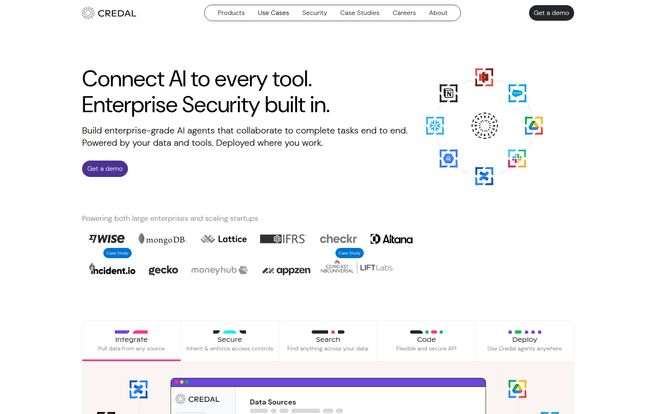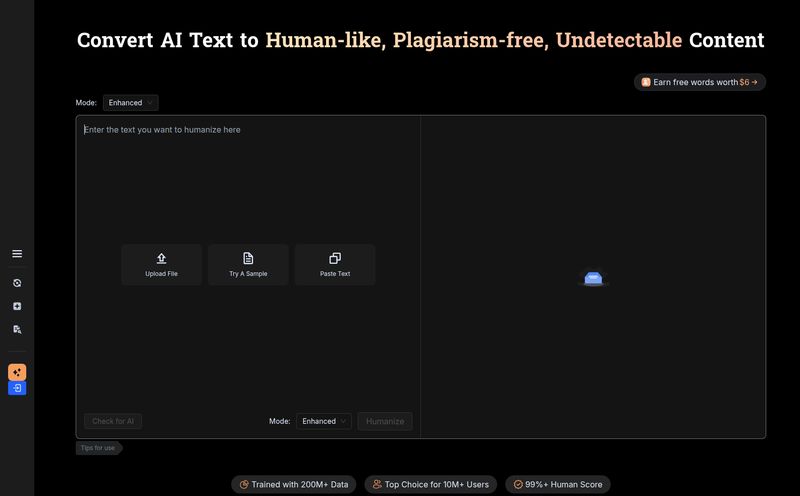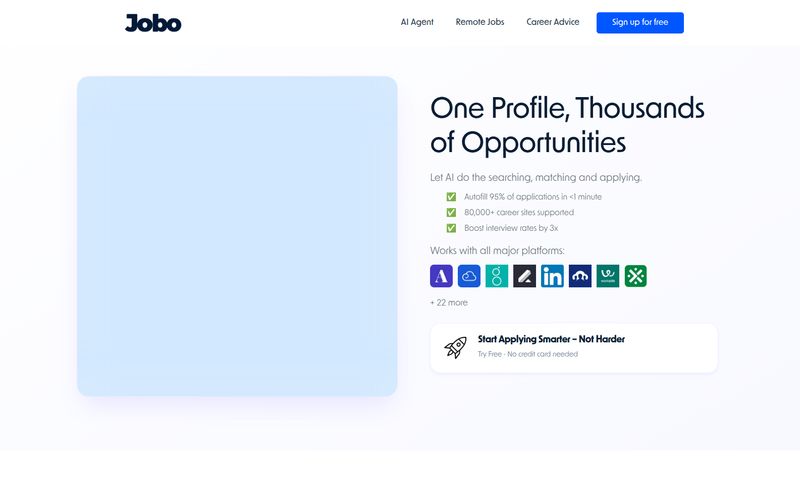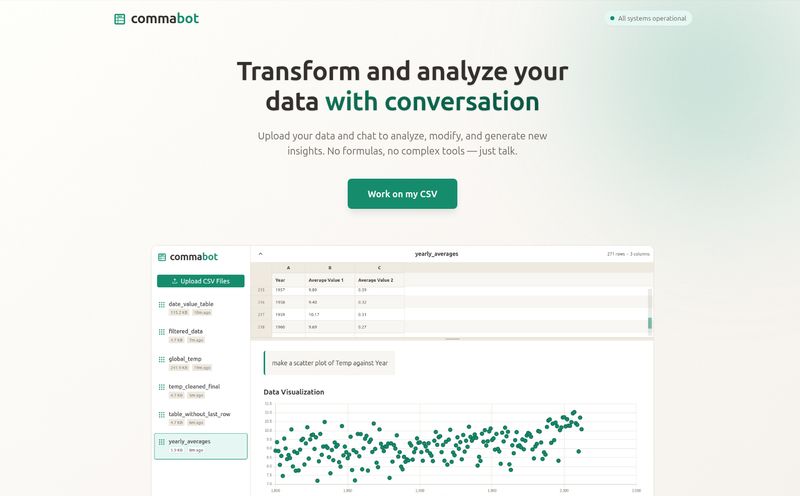Alright, let’s have a real chat. For the past couple of years, the business world has been in a flat-out gold rush for AI. Everyone, from the intern to the CEO, is trying to figure out how to use tools like ChatGPT to be more productive. And every CISO and IT director in the world has been having a collective panic attack. Why? Because employees, with the best of intentions, have been pasting sensitive company data—code snippets, customer lists, draft contracts—into public AI models. It’s a classic case of shadow IT, and it's a massive, gaping security hole.
We’ve all been there, right? You see the potential, the sheer power of generative AI, but the risk of data leakage is just too high. So the official policy becomes a big, fat “NO.” But that just pushes it underground. So what’s the solution? You can’t put the genie back in the bottle. This is where a tool like Credal walks onto the scene, and I’ve got to say, I'm intrigued.
So, What is Credal, Really?
In the simplest terms, Credal is a secure AI platform for enterprises. Think of it as a super-intelligent, hyper-aware security guard standing between your employees and the powerful AI models they want to use. It gives your team access to a Chat UI, a Slackbot, and an API to work with AI, but it does its work under a security-first principle.
It’s not just another chatbot wrapper. Credal is built on a foundation of what’s called Retrieval-Augmented Generation, or RAG. That’s a fancy way of saying it lets the AI “read” your company’s internal documents to answer questions. But—and this is the critical part—it only lets the AI access the specific data that the individual user already has permission to see. It’s a simple concept that is incredibly difficult to execute well, and it seems to be Credal's entire reason for being.
Taming the Wild West of Enterprise AI
The core problem Credal addresses is the trust gap. How can you trust an AI not to learn from and potentially expose your proprietary information? How do you ensure your team isn’t accidentally violating GDPR or CCPA by feeding Personally Identifiable Information (PII) into a third-party model? These are the questions that keep execs up at night.
Credal’s entire platform is engineered to answer those questions. It’s less about building a new AI and more about creating a secure, compliant, and auditable layer that sits on top of the AI infrastructure you already want to use, whether that’s from OpenAI, Azure, or even your own custom models.
Breaking Down the Features That Matter
I’ve seen a lot of platforms that promise the world. But when you look under the hood, it’s all sizzle and no steak. So let’s look at what Credal is actually offering.
Permission Synchronization is a Game Changer
This, for me, is the crown jewel. Credal connects to your existing data sources—Google Drive, Slack, Notion, Salesforce, you name it—and doesn’t just ingest the data, it ingests the permissions. If your marketing manager, Susan, can’t access the Q4 financial projections in Google Drive, then the AI can’t access them on her behalf either. It syncs these permissions in real-time, so access is always up-to-date. This isn't just a feature; it's a foundational pillar of enterprise security.
Automatic PII Redaction: Your Compliance Best Friend
Here’s another big one. Credal can automatically find and mask sensitive information before it ever leaves your system to be processed by an AI. Think names, email addresses, credit card numbers, social security numbers. It just blacks them out. This is huge for any company operating in a regulated space like healthcare or finance. It turns a potential compliance nightmare into a non-issue.

Visit Credal
A Full Audit Trail for Peace of Mind
If something does go wrong, or if you just need to prove compliance to an auditor, you need a paper trail. Credal logs everything. Every query, every response, every piece of data that was accessed. This level of comprehensive auditing is something that a lot of slapped-together internal solutions miss, and its absence is a massive risk.
Integrations and a Flexible API
A tool is only as good as how well it fits into your existing workflow. Credal comes with a bunch of pre-built data connectors for the usual suspects (Microsoft 365, Confluence, etc.). But what's really interesting is the support for custom data connectors and a flexible REST API. This means your dev team can hook it into proprietary internal systems or build custom, AI-powered applications that inherit all of Credal's security features. It also supports bringing your own LLM, which is a fantastic option for companies with mature AI strategies.
Who Is This Really For?
Let's be crystal clear: this is not a tool for your average startup or solo blogger. Credal is aimed squarely at mid-to-large-sized enterprises. We're talking about companies with complex data structures, strict compliance requirements, and a real, tangible risk associated with data leaks. If your company has a legal department that shudders at the mention of “generative AI,” you are Credal’s target audience.
It’s for organizations that understand the value of their data and the cost of a breach, and are willing to invest in a robust platform to mitigate that risk without stifling innovation.
Let's Talk About Credal's Pricing
If you head over to Credal's pricing page, you won't see a neat little three-tiered pricing chart. You'll see one option: “Enterprises - Custom Pricing.” For some, this is a red flag. For me, in this context, it’s a green one.
It tells me they aren’t selling a one-size-fits-all product. They are selling a solution that requires integration into complex corporate environments. The price will depend on your scale, your specific data sources, whether you need on-premise deployment, and the level of support you need. The Enterprise plan includes things like unlimited seats, SAML/SCIM & Okta integration for single sign-on, white-glove support, and even the ability to bring your own LLM. This isn’t a $20/month SaaS tool; it's a piece of critical infrastructure, and it's priced accordingly.
Are There Any Downsides?
No tool is perfect, and it’s important to be realistic. Based on what I see, the potential hurdles are less about flaws in the product and more about the realities of enterprise software.
- Initial Setup: This isn't a browser extension you install in five minutes. Connecting data sources, configuring permissions, and integrating with your existing security stack will require some initial effort and technical know-how. But that's the price of admission for a truly customized and secure setup.
- Reliance on Your Data: Credal is a powerful engine, but it needs good fuel. The quality of its AI search and responses will directly depend on the quality and organization of your company's internal data. Garbage in, garbage out.
- It's a Commitment: Adopting a platform like Credal is a strategic decision. It’s not something you try for a week and then discard. It requires buy-in from IT, security, legal, and the teams who will be using it.
My Final Verdict on Credal
For a while now, the dominant narrative in corporate IT has been one of restriction. The best way to deal with the security risks of AI was simply to block it. It was the easy answer, but not the right one. It stifled productivity and created a frustrated workforce.
Credal feels like a turn in the conversation. It’s one of the first platforms I've seen that seriously and comprehensively tackles the security and compliance problem head-on, shifting the conversation from “if” we can use AI to “how” we can use it safely. The focus on mirroring existing permissions is, frankly, brilliant and the only sustainable way to do this at scale. It’s a tool built for the reality of how large organizations actually work.
Is it for everyone? No. But for the enterprise that wants to responsibly harness the power of AI without betting the farm on data security, Credal looks like a very, very compelling answer.
Frequently Asked Questions
- What is Credal in a nutshell?
- Credal is a secure AI agent platform designed for enterprises. It allows employees to use the power of large language models with company data while ensuring strict security and compliance by masking sensitive information and respecting existing user permissions.
- How does Credal ensure my company's data stays secure?
- Credal uses several key methods: 1) It syncs with your source systems (like Google Drive or Salesforce) to enforce existing user permissions in real-time. 2) It automatically redacts Personally Identifiable Information (PII) before data is sent to an AI model. 3) It provides a full audit log of all interactions.
- Can I use my own Large Language Model (LLM) with Credal?
- Yes. The Enterprise plan explicitly includes a “Bring-your-own LLM” option, as well as support for major models like Azure OpenAI. This offers great flexibility for companies with specific AI strategies or requirements.
- What kind of companies should consider using Credal?
- Credal is best suited for mid-to-large enterprises, particularly those in regulated industries like finance, healthcare, legal, or technology. Any organization with sensitive proprietary data and complex compliance needs is a prime candidate.
- Is Credal difficult to set up?
- As with any enterprise-grade software, some initial setup and configuration are required to connect your data sources and sync permissions. It's not a simple plug-and-play tool, but this allows for a more robust and secure integration into your existing tech stack. Credal offers white-glove support to help with this process.
- What integrations does Credal support?
- Credal offers pre-built connectors for many popular platforms like Slack, Google Suite, Notion, Microsoft, and Salesforce. It also provides a REST API and the ability to build custom data connectors for proprietary or less common systems.
Conclusion
In a world racing to adopt AI, taking a moment to build a secure foundation is not just smart—it's essential. Platforms like Credal represent the next mature step in the evolution of enterprise AI. They move us beyond the initial, slightly chaotic phase of experimentation into an era of structured, secure, and truly scalable implementation. By solving the trust and compliance puzzle, Credal isn't just offering a cool piece of tech; it's offering peace of mind. And in this industry, that's worth its weight in gold.



